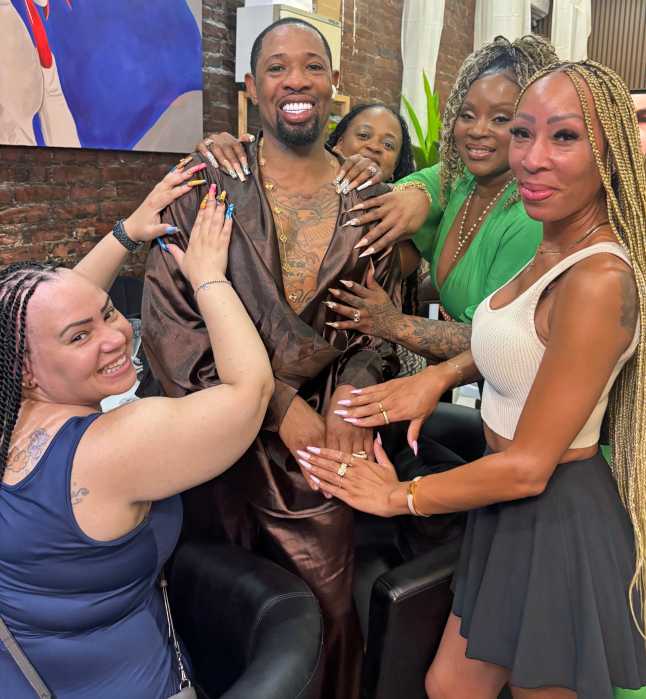No matter who wins the coming week's Iowa caucuses and New Hampshire primary, the 2008 presidential campaign – at least on the Democratic side – has been a remarkable political milestone for the LGBT community. To be sure, the presidential candidates have been far from perfect. The top three Democrats have danced around marriage equality more clumsily than Britney Spears moved at the 2007 MTV Music Awards.
But consider these major developments:
The Distance We've Traveled
First, full civil unions, not limited domestic partnerships, have become the Democrats' fallback position on the recognition of same-sex relationships. That's not to say it's any less maddening to watch Hillary Clinton, Barack Obama, and John Edwards blur the difference between real marriage equality and separate-and-unequal civil unions.
In states that have enacted civil union laws already, the failure of employers to recognize civil unions as the equal to marriage proves that marriage makes a word of difference – big difference.
But for the debate among the Democratic candidates to be between civil unions and real marriage equality is not a bad place for the LGBT community to be.
Practically speaking, a
Democratic president could not, just yet, succeed in legislating a national civil union law, which is what they are pledging to do. But given how far the balance has shifted our way, a federal domestic partnership law of some kind – specifically a law granting benefits to federal workers and perhaps giving tax and Social Security equity to same-sex couples, as well as reform to grant residency status to the same-sex partners of US citizens – may be within reach in the next session of Congress.
Second, the Democrats are united in their revulsion at Don't Ask, Don't Tell. This includes Hillary Clinton, whose husband signed the Free World's most discriminatory military personnel policy in 1993. Though the Republican candidates advocate retaining the policy – even as they support a war exhausting American military personnel – their voices are tepid in contrast to the Democrats' consistent advocacy of throwing the policy into the dustbin of history.
That's quite a change from where Democratic nominee John Kerry stood in 2004, when he went no further than saying he would “sit down with lead commanders in the military” to assess the policy, but that he nonetheless “respected… 'unit cohesion' issues.”
Third, Republican flip-flopping on gay rights – with formerly pro-gay rights candidates like Mitt Romney and Rudy Giuliani changing their views to pander to the far right-wing Republican primary voters – has become a political liability even among the GOP base. Republicans, according to the polls, are now as upset with the anti-gay hypocrisy coming from Romney and Giuliani as they were with the two Northeasterners having been pro-gay to begin with.
Giuliani has completely lost his ability to say, “You may not agree with where I stand, but you'll always know where I stand” – at least as far as gay rights go. That had been the very essence and appeal of his candidacy. And if Romney loses either Iowa or New Hampshire, both states where he was once expected to coast to victory, he can blame his own cynical repositioning on LGBT issues. According to statewide polls in both states, significant percentages of Republicans say Romney tells them whatever he thinks they want to hear – a major turnoff, they hasten to add.
The scorn for the Giuliani and Romney flip-flops is spectacular news for our community. It serves as a warning to leading Democrats who have also flip-flopped on LGBT issues because of potential national ambition. In Maryland, for instance, Governor Martin O'Malley advocated full marriage equality as Baltimore mayor, only to flip-flop to supporting merely civil unions once he reached the governor's mansion.
In New Jersey, Governor Jon Corzine went from advocating full marriage equality as a US Senate candidate in 2000, to supporting merely civil unions as a senator and gubernatorial candidate, to returning full-circle to saying he would sign a marriage equality bill if it reached his desk, though he prefers that not happen before the presidential election.
What has the 2008 presidential campaign shown Democrats with future White House dreams? Modifying pro-gay positions to appeal to Republicans in a national general election will do nothing to buy Republican support, and may even cost votes among the progressive Democratic base.
That lesson should prove instructive as well to New York Mayor Michael Bloomberg- pro-marriage equality since 2005 – should he throw an independent hat in the ring.
So make no mistake: The progress the LGBT community has made in the 2008 campaign not only has ramifications in the short term, but also for presidential elections to come. The ball is now in our court.
Yoav Sivan is the LGBT coordinator of the International Union of Socialist Youth and a board member of the Jerusalem Open House. A resident of Tel Aviv who has lived in the United States, Sivan is a frequent commentator on American politics. HIS WEBSITE/A>






























